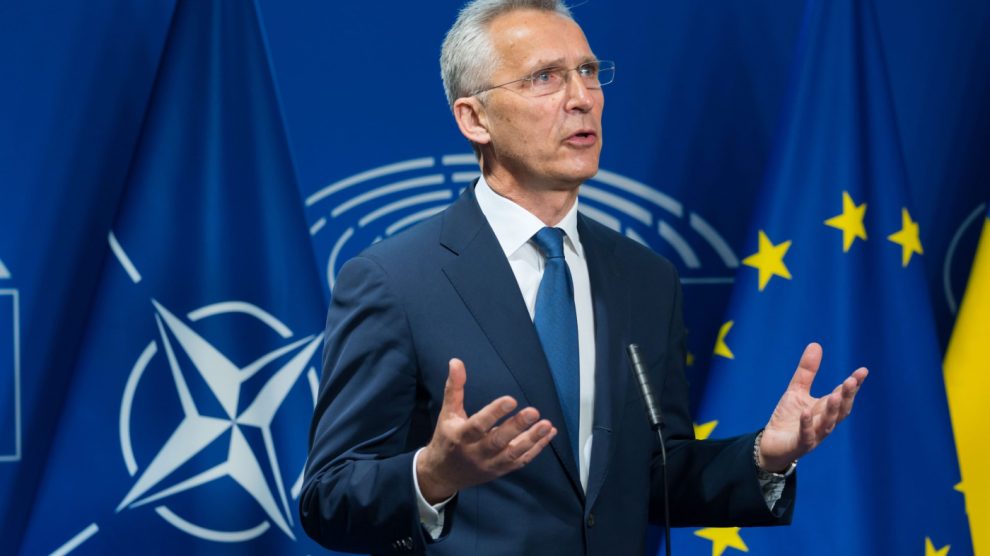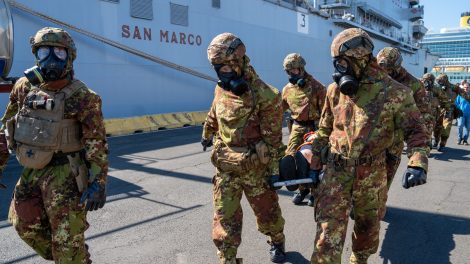The Stoltenberg-Meloni meeting. On Thursday, NATO’s Secretary-General will travel to Rome. He is slated to meet with Prime Minister Giorgia Meloni and Defence Minister Guido Crosetto. As it’s the first time Mr Stoltenberg meets with the new government, the day marks an important moment to discuss the Alliance’s priorities and Italy’s positioning within it.
- The two already spoke over the phone, with PM Meloni reaffirming “full support for Ukraine against the Russian aggression and the importance, in the perspective of a global approach, of strengthening NATO’s commitment to countering threats of various kinds from all strategic directions, including the South.”
NATO’s open dossiers start with Ukraine, where the Alliance’s attention is currently focused. Russia is once again NATO’s main adversary, and Italy has so far participated fully in the effort to strengthen security and deterrence on its eastern flank. The government recently confirmed Rome intends to continue helping Kyiv.
- On Monday, Minister Crosetto spoke with US Defence Secretary Lloyd Austin and reiterated how Italy is “a faithful ally that the US can count on, today more than ever.” The latter expressed appreciation for Rome’s contributions to the Alliance, and the two agreed to meet as soon as possible.
Common European Defence remains one of the most critical issues to tackle; its nature and relationship with NATO are still to be clarified. The position of the last government was clear in excluding any form of ‘third party’ with the transatlantic West and understanding European defence as a continental pillar of the single security of the transatlantic space. Ms Meloni’s executive seems aligned with that position.
Mind the Med. The matter of NATO’s Southern flank remains open. Italy is concerned that the war in Ukraine, along with the accession of Sweden and Finland (which is fully supported by the government) may shift the Allies’ attention to the North and the East to the detriment of the Mediterranean area.
- Italy has always pressed for NATO to turn its attention to this strategic quadrant as well and avoid leaving the region undefended. Ms Meloni, as she anticipated in her phone call, seems intent on pursuing this path.
The Cyber Conference. Mr Stoltenberg will also deliver a keynote speech at the NATO Cyber Defence Pledge Conference, which is hosted by Italy and the United States in Rome on 9-10 November 2022 and was anticipated last week by our sister site.
- Russia’s unprovoked and unjustified war against Ukraine has once again highlighted the overwhelming impact of the cyber dimension on our security and the imperative of cyber preparedness reads a note from Italy’s MFA and the US State Department.
- The Rome conference will focus on “Resilience, Preparedness and Responsiveness to Cyber Threats to Critical Infrastructure.” Allies will discuss these and other crucial issues in order to increase our cyber resilience both nationally and as an alliance.
The programme will consist of two parts. Initially, the States’ Permanent Representatives will review the key pillars underpinning NATO’s effort to counter cyber threats: threat analysis, resilience, and response. Then, cyber leaders and experts will convene in panels to discuss protecting the energy sector from cyber threats and ensuring NATO’s Cyber Defence Pledge keeps pace with the evolving cyber threat landscape.
- The conference is closed to the public. However, we’ll get speeches by Edmondo Cirielli, Italy’s Deputy Foreign Minister; Anne Neuberger, Deputy National Security Advisor with responsibility for cybersecurity and emerging technologies at the White House; and Mr Stoltenberg himself.
At June’s NATO Summit in Madrid, the Allies reaffirmed that resilience is both a national responsibility and a collective effort. They committed to accelerating development in all areas, including increasing resilience to cyber and hybrid threats. The summit also recognised that energy security is a top priority. Finally, the 30 States agreed to build and exercise a virtual cyber rapid response capability to counter major malicious cyber activities on a voluntary basis and using national resources.




